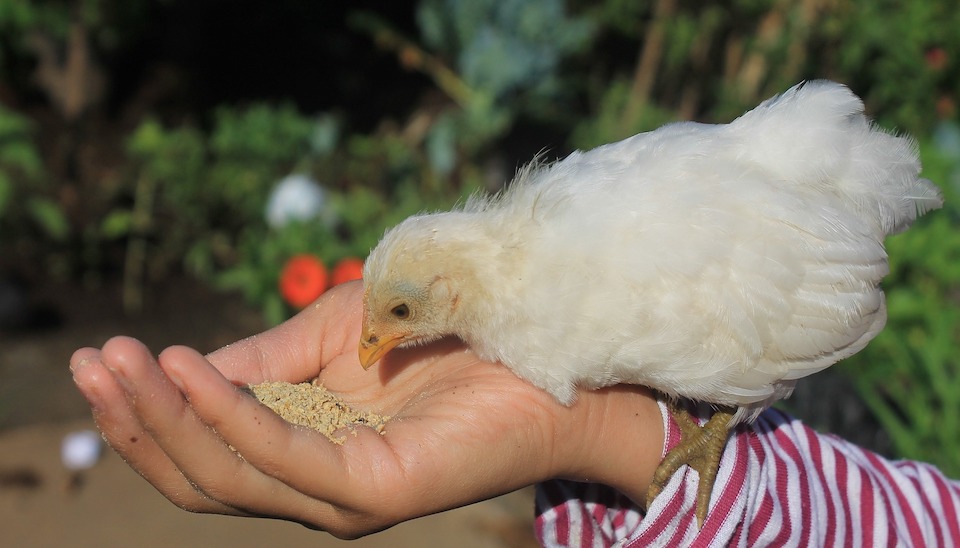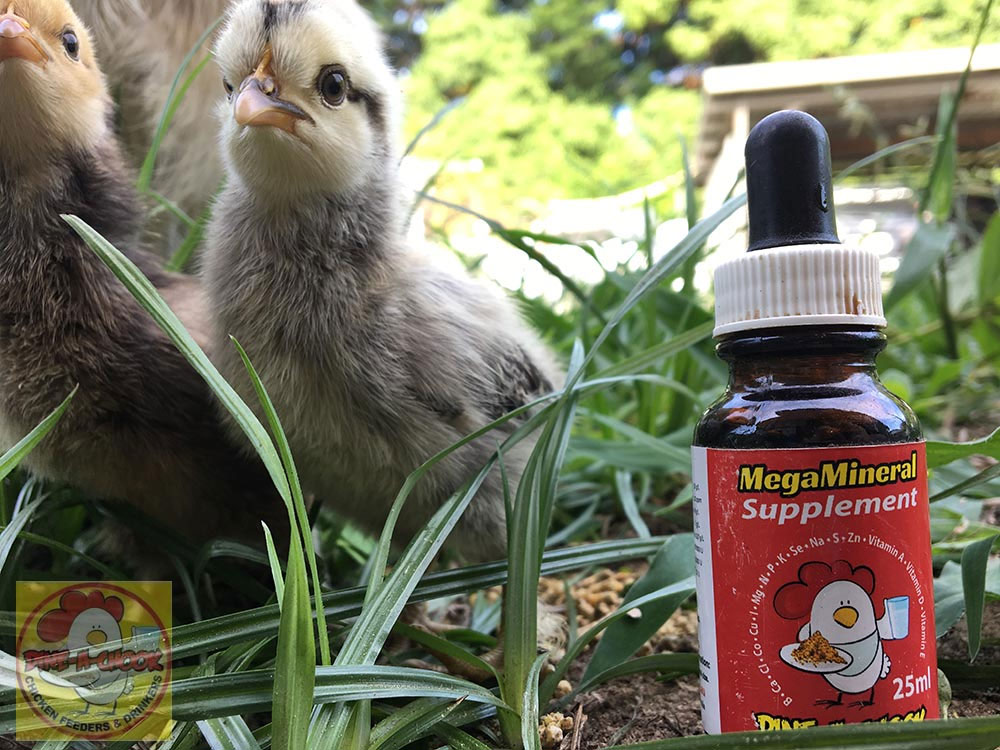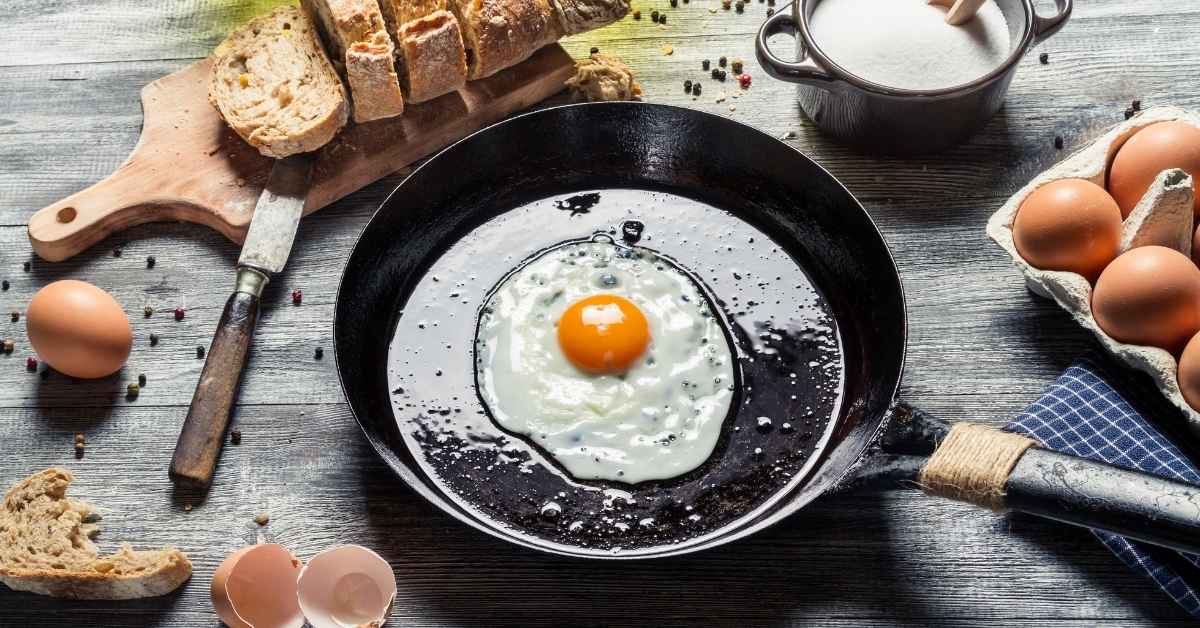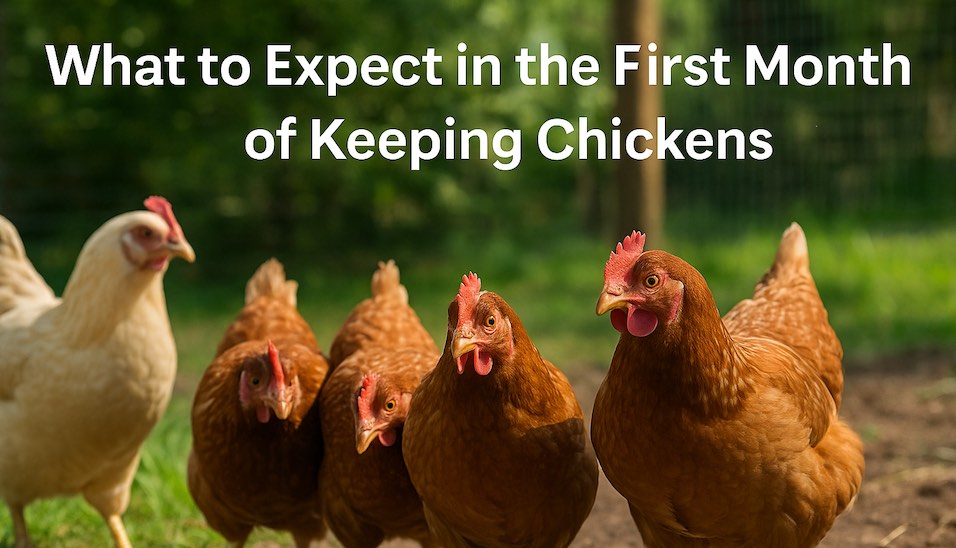What Do Baby Chicks Eat? Complete Guide to Feeding Baby Chickens
What do baby chicks eat? 10 things you need to know
Raising chicks is a wonderful experience. Little chicks are cute balls of fluff and they are adorable to watch. And fortunately, feeding baby chicks is easy if you follow our simple guide from Dine-A-Chook.
Whether you incubated eggs, purchased day-old chicks, or set eggs under a mother hen, our 10 essential tips will ensure your chicks have all of the nutrients they need to grow and thrive.
10 things you need to know about feeding baby chicks
1. Baby chicks don’t need to eat straight away
Chicks don’t need feed and water until about 24 hours after hatching.
Baby chickens are precocial – this means that they are born with feathers and are able to walk within a few hours of hatching. In the egg, chicks absorb the egg yolk which provides them with nutrients for 24-72 hours. This is the reason why day-old chicks can be shipped from hatcheries.
Because newly-hatched chicks have recently absorbed the egg yolk, they do not need to eat or drink for at least 24 hours.
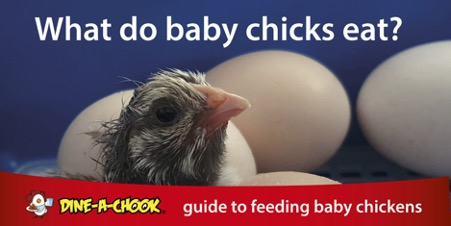
If you are incubating eggs, the chicks should stay in the incubator until they are completely dry. Once the chicks are moved to the brooder, you should provide feed and water. If you set eggs under a hen, she will show her chicks the food when it is time for them to eat.
2. Chicks are not born knowing how to eat or drink
Although chicks are able to walk soon after hatching, they are not born knowing how to eat or drink. In the wild, their mother would show them. If you are raising the chicks yourself, you need to show them how to eat and drink.
Until they learn what food is, the answer to ‘What do baby chicks eat?’ is everything. That includes brooder bedding, which is why a plain floor surface such as newspaper should be used for the first few days. Never put any non-food item in the brooder that your new chicks could eat.
New chicks will peck at anything that looks like food, from newsprint to your fingers.
How to teach your baby chicks to eat:
Scatter feed over the brooder floor and tap the feed with your fingernail to call the chicks over and encourage them to peck. This is similar to what a mother hen will do to show her chicks where food is.
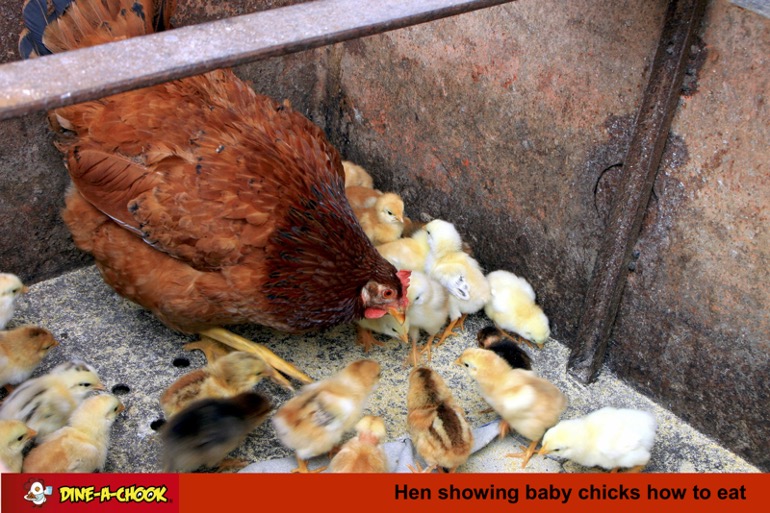
Once your chicks are eating consistently, move the feed to a dedicated chicken feeder in order to limit contamination with faeces and prevent disease.
Contaminated feed should always be removed!
How to teach your chicks to drink:
Gently dip the tip of their beak into the waterer. Do this for each chick individually. Once one chick gets the idea, others will follow. However, you may need to repeat the process several times before your chicks learn to drink alone.
Watch your chicks carefully for the first few days. Even once most of the chicks have gotten the hang of eating and drinking, there may be one or two that require further instruction.
3. Choosing the best chick feed
Feed for baby chicks is called a chick starter. Usually chick starters come as a crumble, which is a smaller size than adult chicken feed. Crumbles are better for little beaks!
A chick starter is designed to provide everything that chicks need to thrive and grow. Premium chick starters like Country Heritage and Laucke Mills have been designed by poultry nutritionists to provide a complete and balanced diet.
Choosing a top-quality chick feed will ensure your little chicks grow into healthy, productive hens. You should give your chicks unlimited access to their chick starter during the day.
4. Medicated versus unmedicated chick starter
Chick starters can be medicated or unmedicated. It is important to choose the right option for your chicks.
The term “medicated” refers to a coccidiostat, which is a medication that helps prevent coccidiosis. Coccidiosis is a common chicken disease caused by the coccidia parasite. Coccidia are found everywhere, and all chickens carry them. A healthy adult bird can cope with coccidia infection, but coccidiosis in chicks is often fatal. Chicks need to build up their immunity and a coccidiostat helps them do just that.
Medicated chick feed
- Contains a low-dose coccidiostat such as amprolium
- Should never be fed to chicks that have been vaccinated against coccidiosis, as the medication and vaccine cancel each other out
- Should never be fed to adult laying hens where you are consuming the eggs
Unmedicated chick feed
- Does not contain a coccidiostat
- Is suitable for chicks that have been vaccinated for coccidiosis
- Leaves chicks more vulnerable to coccidiosis
- May be more suitable if adult laying hens are able to steal the chicks’ feed
5. The dangers of homemade baby chick feed
Some websites suggest that you can safely feed chicks on a range of scraps and grain, or that you should make your own chick starter.
Making your own chicken feed for baby chicks is dangerous because:
- Nutritional deficiencies can cause illness and death
- Chicks are extra-vulnerable to nutritional deficiencies
- Without a complete and balanced diet, chicks will fail to thrive and grow
- A poor diet as a chick affects the health and productivity of a chicken for its whole life
- The protein, energy, carbohydrate, vitamin and mineral content of all feed components must be carefully balanced to create a complete diet, which is hard to do on a home-scale
Chick starters are developed by qualified poultry nutritionists and carefully balanced to ensure they contain absolutely everything your chicks need to thrive. We at Dine-A-Chook would never recommend making homemade feed for baby chicks.
6. Baby chicks and water: hazard-reduction
After the first 24 hours, baby chicks need free access to fresh water at all times.
However, water can be dangerous for new chicks because:
- They can drown, even in very shallow dishes
- Chicks cannot regulate their body temperature and can die if they get wet and cold
- A damp brooder (e.g. spillage) helps spread disease and can cause respiratory illness
- Contaminated water (from faeces) spreads coccidiosis and other diseases
Protect your chicks by using a waterer with a drinking cup or nipple outlet.
Drinking cups and nipples:
- Reduce spillage
- Prevent contamination with faeces
- Stop chicks from standing in the water
- Prevent drowning
Chicks can use a drinking cup or nipple outlet from day one. The Dine-A-Chook 2L Drinker is a great option for brooders due to the small size.
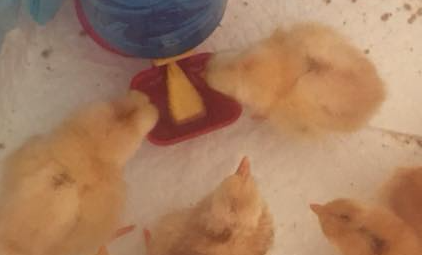
If you don't have room for a drinker in your brooder, ensure you place stones in the water dish so chicks cannot sit in it or drown. Remove the wet litter around the drinker often and monitor chicks carefully to ensure they do not fall into the water and become wet and cold.
7. Treats, scraps and grit – What not to feed baby chicks
The simple answer to the question of ‘What do baby chicks eat?’ is everything. Chicks eat grains, seeds, pulses, fruit and vegetable scraps, and treats like bread and mealworms. Baby chicks even eat egg and meat. But just because chicks eat these things, doesn’t mean that they are good for them.
Baby chicks raised by a mother hen will start eating “treats” within a few days of hatching. However, this does not necessarily mean that we should do the same when raising chicks in a brooder.
If your chicks have a complete starter feed, anything that isn’t this feed is a treat. This includes scraps, forage and other grains.
Why you shouldn’t give chicks treats for at least a month:
- While they are still learning to recognize their feed, giving chicks treats confuses them
- Young chicks don’t eat a lot, so even a seemingly tiny treat can have a big impact on nutrition
- Chicks need to consume as much nutritionally-balanced chick starter as possible in order to thrive
- Once chicks begin eating anything other than chick starter, they need grit. Oyster shell grit is dangerous for chicks and many common seashell grits are too large for very small chicks. New chicks may even fill up on grit instead of feed!
When your chicks are ready for a more varied diet, follow these simple rules for feeding treats to chicks:
- Ensure your chicks have access to a suitable source of grit
- Choose soft treats – fruit or cooked veggies are a great starting point
- Avoid unhealthy treats like processed carbohydrates, e.g. bread, and anything high in sugar or fat
- Do not feed more treats than can be eaten in a few minutes
- Pick up any uneaten treats straight away
8. Preventing deficiencies
Chicks need a nutritionally-balanced diet and a complete range of vitamins and minerals to grow and thrive.
Although a quality chick starter provides a complete, balanced diet, adding a low-dose vitamin and mineral supplement provides extra insurance against deficiency.
Dine-A-Chook Mega Mineral is a bio-available vitamin and mineral supplement designed for daily use. Start your chicks off right with Mega Mineral to provide that little bit extra and prevent diet-related illnesses.
9. Deficiencies in chicks – symptoms and treatment
Nutritional deficiencies can develop very quickly in baby chicks if their diet is not correct. Fortunately, deficiencies are rare except where chicks are being fed a poorly-balanced, homemade diet. This is why we at Dine-A-Chook recommend feeding baby chicks a complete chick starter feed.
The most commonly recognizable deficiencies in chicks are vitamin E deficiency, also known as crazy chick disease, and vitamin B1 deficiency. Both deficiencies can be fatal and are best treated with a vitamin and mineral supplement as soon as they are recognized.
| Vitamin E deficiency (Crazy chick disease) | Vitamin B1 deficiency |
| Usually within the first month of hatching
Chicks are unable to walk and their head may twist sideways, over their back or down Even when treated, chicks can be left with a permanent head tilt |
Usually within a week of hatching
Chicks are unable to stand and their head is tilted up to the sky Chicks usually recover rapidly with treatment |
10. Preventing disease in baby chicks
Babies of all species are more vulnerable to illness and disease, and baby chickens are no different.
Keeping the brooder clean and dry, and preventing the contamination of feed and water with faeces, will help keep your chicks safe from disease.
Adding Apple Cider Vinegar to the water has been shown to help prevent the spread of diseases, including coccidiosis.
Chicks that are raised without a mother hen often have a less robust immune system and are more susceptible to parasites. Using an avian-specific probiotic in their water helps develop a healthy gut flora which protects from parasites, including coccidiosis.
Learn more about raising baby chicks on the Dine-A-Chook blog:
- Creating a brooder box for baby chickens
- Introducing new chicks to the flock
- How to treat spraddle leg
- The best names for chickens
Happy chick keeping!
Rachael at Dine-A-Chook Australia


